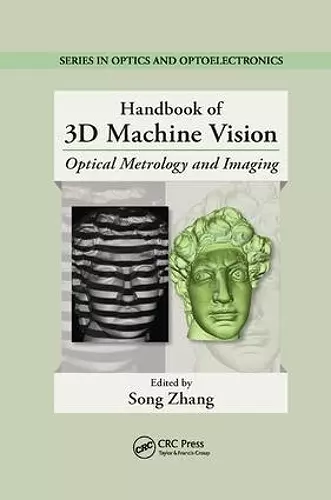Handbook of 3D Machine Vision
Optical Metrology and Imaging
Format:Paperback
Publisher:Taylor & Francis Ltd
Published:25th Sep '17
Currently unavailable, and unfortunately no date known when it will be back
This paperback is available in another edition too:
- Hardback£205.00was £205.00(9781439872192)

With the ongoing release of 3D movies and the emergence of 3D TVs, 3D imaging technologies have penetrated our daily lives. Yet choosing from the numerous 3D vision methods available can be frustrating for scientists and engineers, especially without a comprehensive resource to consult. Filling this gap, Handbook of 3D Machine Vision: Optical Metrology and Imaging gives an extensive, in-depth look at the most popular 3D imaging techniques. It focuses on noninvasive, noncontact optical methods (optical metrology and imaging).
The handbook begins with the well-studied method of stereo vision and explains how random speckle patterns or space-time varying patterns substantially improve the results of stereo vision. It then discusses stereo particle image velocimetry as a major experimental means in fluid dynamics, the robust and easy-to-implement structured-light technique for computer science applications, digital holography for performing micro- to nanoscale measurements, and grating, interferometry, and fringe projection techniques for precisely measuring dynamically deformable natural objects.
The book goes on to describe techniques that do not require triangulation to recover a 3D shape, including time-of-flight techniques and uniaxial 3D shape measurement, as well as 3D measurement techniques that are not restricted to surface capture, such as 3D ultrasound, optical coherence tomography, and 3D endoscopy. The book also explores how novel 3D imaging techniques are being applied in the promising field of biometrics—which may prove essential to security and public safety.
Written by key players in the field and inventors of important imaging technologies, this authoritative, state-of-the-art handbook helps you understand the core of 3D imaging technology and choose the proper 3D imaging technique for your needs. For each technique, the book provides its mathematical foundations, summarizes its successful applications, and discusses its limitations.
"The chapters are well written and offer a uniform high standard of content. … This book should appeal to any academic or industrial researcher, or developer looking to expand their skills into machine vision: it would be particularly useful to any young researcher just starting out. The expert in the field should also find something of interest. The concepts outlined have wider applicability and this is a good place to start for anyone looking for an overview of these technologies."
—John Watson, University of Aberdeen, Optics and Lasers in Engineering
ISBN: 9781138199576
Dimensions: unknown
Weight: 660g
414 pages